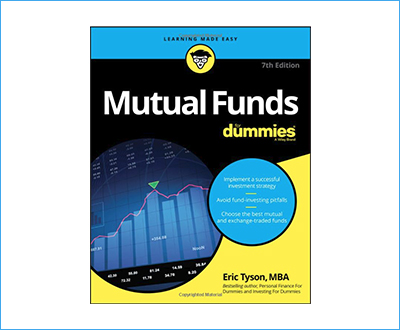Mutual funds are one of the most common ways of investing money, whether you are an active trader, just looking to save money for retirement, or anything in between. Mutual Funds for Dummies is one of the best-selling introductory books that approach these investment vehicles. In this article, we review its most recent edition to help you decide whether to add it to your personal finance library.
Mutual Funds for Dummies Overview
Mutual Funds for Dummies is a good general introduction to the subject of mutual funds. The book is written by the mutual funds expert Eric Tyson, who has a long resume of financial advice work and has written several other books on finance subjects for the Dummies series.

As ‘mutual fund’ is an umbrella term that covers several different cooperative investment vehicles, a decent segment of the book serves to introduce the different kinds of mutual funds and the advantages and disadvantages of each kind. The author also takes the time to introduce some alternatives to mutual funds that can serve similar goals. It also has sections devoted to keeping up with news relating to mutual funds and other financial affairs, teaching you the vocabulary necessary to follow them, and seeing how they can affect your investments.
The book is written for financial beginners, so it eases you into the more difficult concepts while still being thorough. It is styled primarily as an introduction and a reference, so it does a good job of introducing various key terms and explaining some of the more complicated concepts, though it does also feature a nice section on how to select funds to invest in.
Bonus read: Real Estate Investing for Dummies Book Review
What We Learned
- How varied mutual funds are. While all mutual funds are in the business of making money, how they do it varies significantly from fund to fund. Some focus on stocks, while others prefer bonds, currencies, or short-term securities. Understanding those differences is key to finding the right funds for your investment priorities.
- There are no one-size-fits-all solutions. Looking at the financial market from the outside, it is easy to feel like there is one or a few winning strategies when it comes to investing, but that is far from the truth. Certain strategies earn better short-term returns, while others do better in the long term, for example. The right mutual fund for you depends on your personal financial needs.
- It is all about risk. All investing comes with a certain amount of risk. Managing it, mitigating it, and being prepared for it are a big part of mutual fund investments. Different types of funds reduce the risks for their investors in different ways, which can make a lot of difference in how the fund is run, what it invests in, and what kind of returns you can expect to see.
- The perfect types of funds to invest in. In the book, you will find a list of funds that are great for investing due to their good management, low fees, and targeted investment objectives.
Strengths and Weaknesses
What We Liked
The author does a very good job of easing the reader into the complex world of mutual fund investments. There is very little jargon, and most of the words that a novice to personal finance would not know are defined clearly and early on in the text. True to its name, Mutual Funds for Dummies goes into great detail about just what mutual funds are and their various different subtypes and variations, as well as how they make money and are managed. For novices to the topic, it is a thorough and accessible summary.
Another thing we liked about it is that it is great at helping you decide whether minimal risk accounts or middle of the road risk accounts are better for you. If you are anxious and don’t know what to choose, this book is for you. Tyson does a great job of presenting mutual funds in a way that is not condescending, even if the target public is beginners.
What Could Have Been Done Better
While the book goes on at length about the various kinds of mutual funds and how they operate, it is relatively short on practical knowledge. Although it does feature a section on analyzing funds and choosing the best ones, it is only a relatively small part of the book, and it is quite short when it comes to strategies and techniques you can use.
Another con we found when reading this book is that it tends to get a little repetitive at times. While repetition is important for beginners, concise information is better. At times, you might feel as if you need to hunt for the information you want. Some people have also noticed that the author seems to insist too much on Vanguard, which made them question his affiliation with it.
Conclusion
When it comes to providing a basic grounding in how mutual funds work, Mutual Funds for Dummies serves as a perfect introduction. It contains a lot of information delivered in a relaxed style that is easy to read. It is short on practical advice, but gives plenty of pointers as to where to find it. How did you find the book? Let us know about your experience!